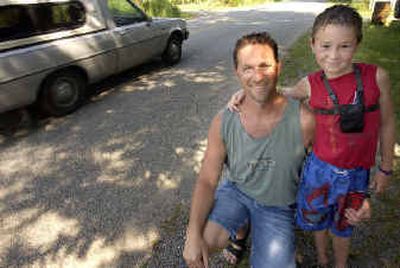No warning: Child at play

HAUSER LAKE, Idaho – Jody Mask dreads the day a passing car honks at his son, Keaton, because the little boy is chasing a runaway ball in the street.
Keaton, 7, might hear the horn if his hearing aid batteries are working. But chances are just as good that Keaton won’t hear the horn. The boy with the freckled nose is comfortable with his deafness and often too busy playing to tell anyone when his batteries are dead.
“I don’t want to be the parent who’s always right there on top of him,” Mask says as Keaton throws a basketball in their Hauser Lake yard. “I want to let him have some freedom. But I worry all the time.”
The Masks live on a straight section of North Hauser Lake Road. The speed limit is 25 mph, which drivers obey mostly around curves. Mask says he often sees cars accelerate on the narrow straightaway that passes his front yard.
He recently decided that signs warning drivers that a deaf child lives in the area might allow him the freedom to dash into the house to answer the phone while Keaton remains outside playing. The idea seemed a no-brainer to Mask, and he wondered why it hadn’t occurred to him sooner. He called the Post Falls Highway District to request signs 500 feet from each end of his property.
The highway district said no.
“We have people who ask for signs that say ‘Children at play – slow,’ ” says Bob Wilbur, a Post Falls Highway District commissioner. “That’s not a legal sign. Roads are meant for travel, not for kids to play on.”
Mask talked only to the district’s receptionist, who told him he could post his own warning signs on his property. Wilbur wasn’t aware of Mask’s request, but he says the receptionist gave Mask the correct information.
The highway district follows guidelines in the Federal Highway Administration’s Manual on Uniform Traffic Control. The manual discourages warning signs that suggest a higher level of personal safety on roadways than is reasonable, Wilbur says.
“You don’t allow kids to play out on a freeway. This is no different than ‘Slow down, duck crossing,’ ” he says. “I’ll look it up and see what we can do, but offhand I’d have to say no, we can’t do it.”
The highway district’s answer disheartened Mask. He didn’t expect objections to his efforts to protect his son. Pennie Cooper, executive director of the Idaho Council for the Deaf and Hard of Hearing, says neither did the Nampa mother she helped in 2001.
The mother asked Nampa’s public works department for a sign warning drivers about a deaf child in the area. She also was told to post her own sign in her yard.
“She didn’t want people to know where the deaf child lives,” Cooper says. “Then someone knows they can take the child because she can’t hear them coming.”
Cooper was surprised at Nampa’s response because the Ada County Highway District consistently approved requests for such warning signs. She accompanied the mother to a City Council meeting, where the woman explained her worry that her child might not hear a car’s horn. A councilman asked why she needed a sign and didn’t watch her child.
“Even the most vigilant parent can’t see their kids every moment,” Cooper says.
Cooper researched how other cities and highway districts responded to such requests and found no pattern. Coeur d’Alene had denied a request for a warning sign about a blind child, saying it would lead to too many people asking for signs. Lewiston, Boise, Meridian, Eagle, Kuna and Pocatello had approved warning signs.
Ultimately, Nampa granted the mother the sign. Cooper says she’ll help Mask any way she can, but such decisions seem to depend on the discretion of those in control.
Mask believes Keaton was born mostly deaf. He was 3 when doctors diagnosed him with 5 percent hearing in his left ear and profound deafness in his right. A cochlear implant at 4 improved Keaton’s hearing, but his first language was signing by then. He learned speech slowly because he used his hands to speak.
Mask, a divorced father with joint custody of Keaton, found himself hyper-vigilant around his deaf boy. Mask hunts, fishes, camps and snowmobiles and wants to share those activities with Keaton. But he worries constantly that he’ll lose his son and Keaton won’t hear him calling.
Mask panicked recently at Silverwood Theme Park when Keaton disappeared among a sea of children in a pool. Keaton was right where they’d agreed, but he’d crouched and Mask lost sight of him. Keaton, Mask discovered, never took his eyes off his dad.
“He always knows where I am,” Mask says.
Mask is considering buying Keaton a dog trained to assist deaf people. But even a dog might not help during those little-boy moments when Keaton forgets all his safety lessons and dashes into the street to save his basketball.
Wilbur suggested Mask put his sign request on the highway district’s next agenda. Mask plans to.
“They put up signs during road work to warn drivers and protect workers,” Mask says. “Why don’t they want to protect children?”